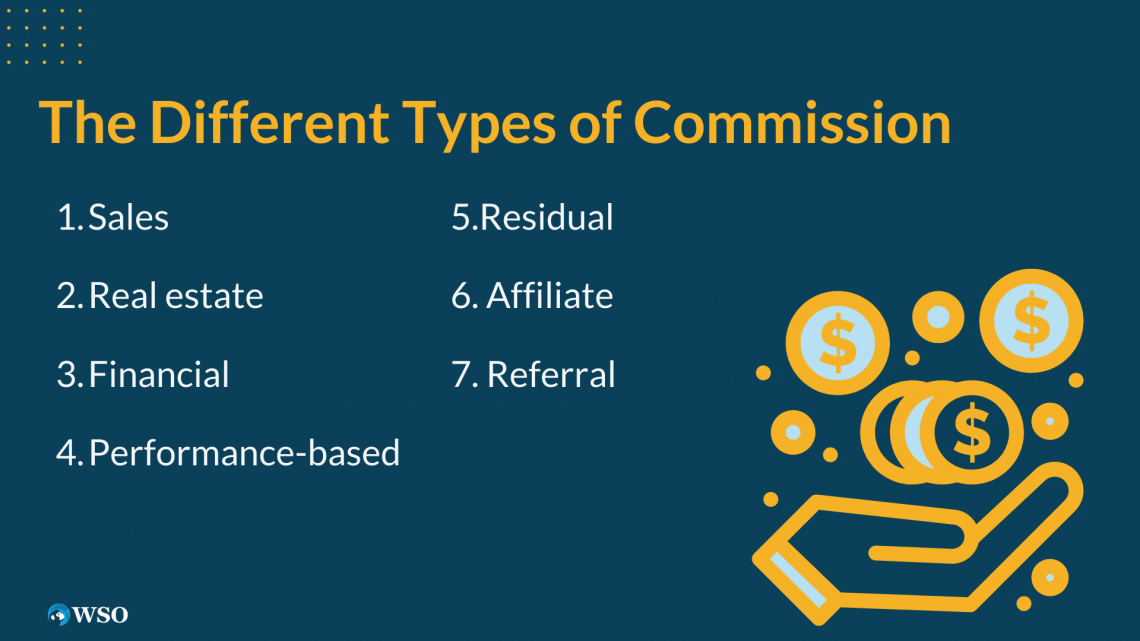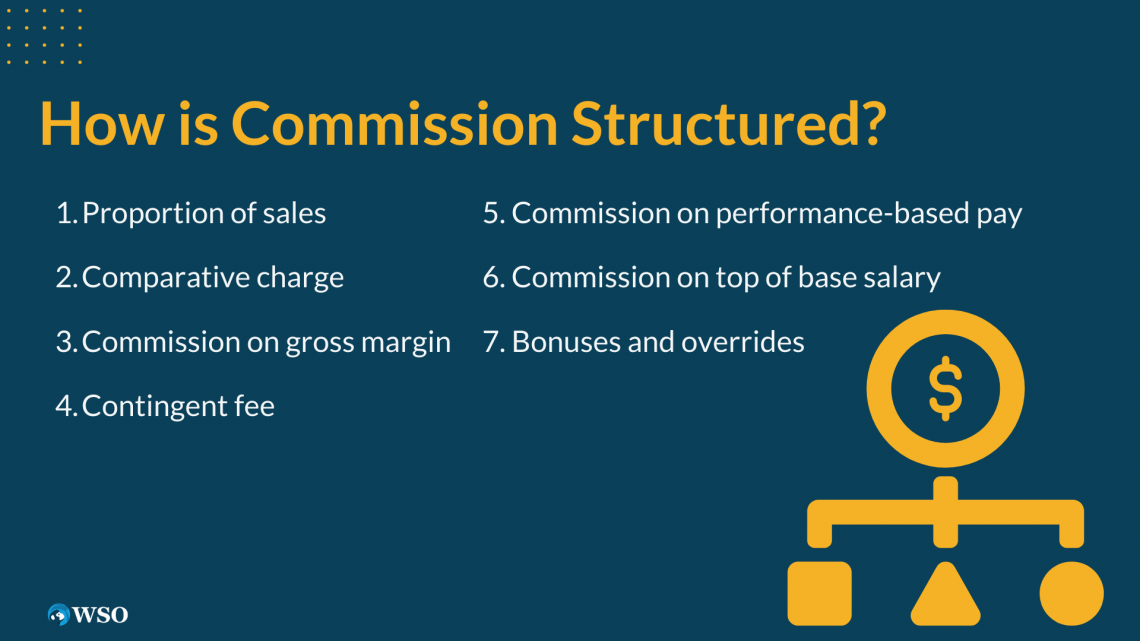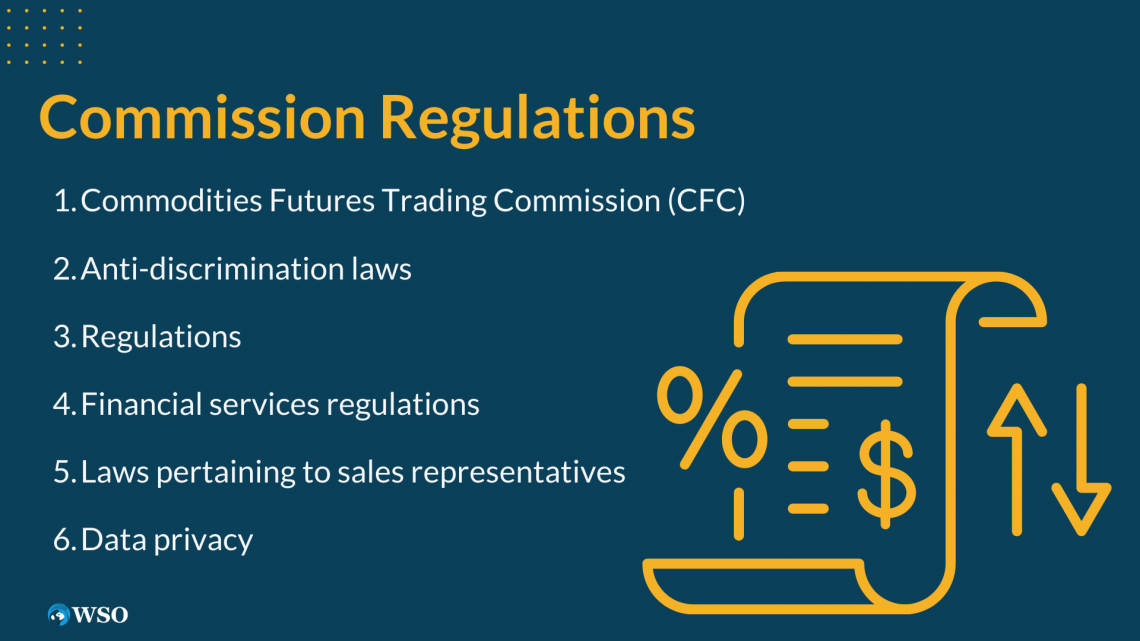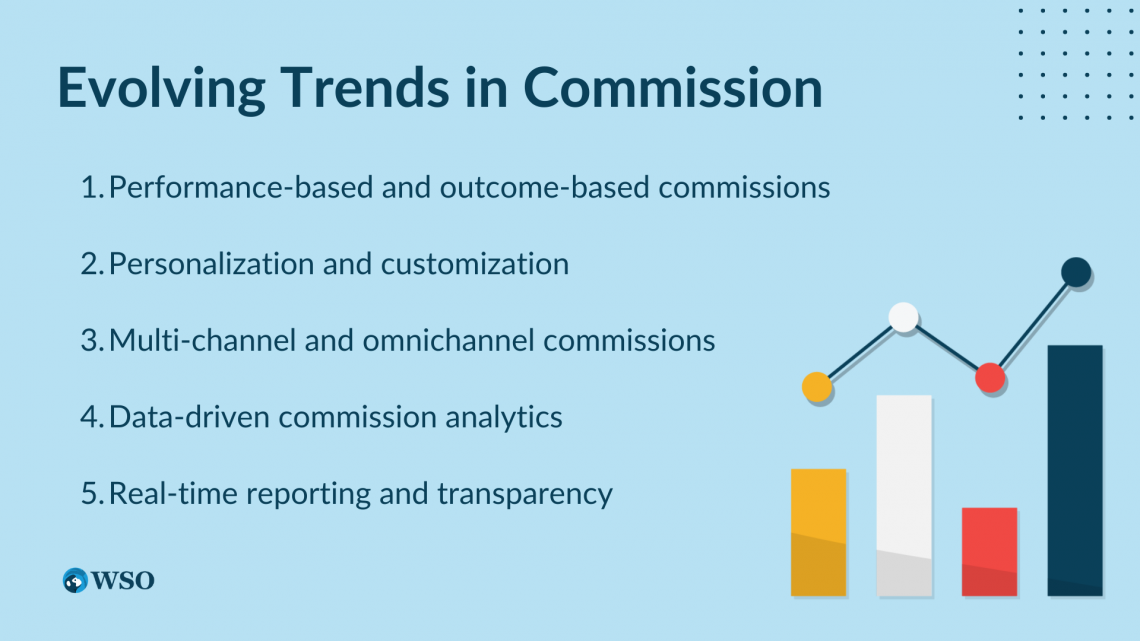Commission
It refers to a sort of payment or reward given to individuals or groups in exchange for their help in concluding a sale or other transaction.
What is Commission?
Commission refers to a sort of payment or reward given to individuals or groups in exchange for their help in concluding a sale or other transaction.

It is frequently employed in sales-driven sectors, including affiliate marketing, banking, and the retail and real estate industries. Individuals are encouraged to produce sales, hit goals, or achieve desired results through it.
A salesperson or agent is often compensated with a predetermined amount of money or a set percentage of the overall transaction value.
Although, other factors, such as the profit margin or specific performance indicators, such as a percentage of the entire sale amount, may also determine it.
It might differ significantly based on the sector, the group, or the particular arrangement between the parties.

A real estate agent's or broker's compensation in the industry may depend on a property's ultimate sale price. Anyone can make money through affiliate marketing by promoting and creating sales for goods or services through their referral links.
By offering financial incentives for hitting sales goals, spurring revenue growth, or cultivating client connections, cash-based remuneration seeks to align the interests of the salesperson or agent with the company's objectives.
It may be a powerful tool to encourage and reward salespeople for their efforts and performance while also motivating them to deliver top-notch customer service and sustain long-lasting client connections.
Key Takeaways
- Salespeople receive recurring compensation for ongoing client relationships or subscription-based business. A charge is incurred each time a customer renews a subscription or makes a recurring transaction.
- Depending on industry standards and performance indicators, commission structures can take many different forms, including percentage-based, tiered, or flat-rate commissions.
- Since salespeople or agents' earnings are closely correlated with their performance, commission-based compensation aligns their interests with the company's objectives.
- Commissions are frequently used in sales-driven businesses like real estate, insurance, financial services, retail, and direct sales.
The Different Types of Commission
Several commission types can be applied in different businesses. Here are a few typical examples:

1. Sales
This is the most common kind, particularly in sectors that rely on sales. A percentage or a set amount of the overall sales value that they produce goes to the salesperson. A team's joint efforts or an individual's sales performance may be used to determine the share.
2. Real estate
When they effectively arrange the sale or purchase of a property, real estate agents and brokers are paid. The buyer's and seller's agents split the payment, normally a percentage of the property's ultimate transaction price.
3. Financial
Financial advisors, brokers, or agents are paid their respective portions when they offer financial items like investment instruments, insurance policies, or annuities. A percentage of the total amount invested or the insurance premium is typically used as the commission.
4. Performance-based
Performance criteria may determine charges in some professions or businesses, such as hitting or exceeding sales targets, quotas, or predetermined objectives. The level of achievement accomplished determines how much money is given.
5. Residual
Recurring payments from continuous client relationships or subscription-based sales are residual commissions. Each time a consumer renews a subscription or makes a recurring transaction, salespeople or agents are paid money.
6. Affiliate
In affiliate marketing, people can make money by advertising goods and services and generating purchases via special referral links. They get paid a fee based on how many referrals are successful or a share of the sales generated by their affiliate links.
7. Referral
Referral commissions are paid when a consumer is recommended to a company and the referral results in a sale or other successful transaction. The referrer receives a fee or incentive for making the introduction, typically in the form of a percentage of the sale's price or a set sum.
How is the Commission Structured?
These structures can differ greatly depending on the sector, the organization, and the specific goals or objectives. Here are a few typical schemes:

1. Proportion of sales
A portion of the total sales value that they produce is paid to salespeople. The rate may be a fixed percentage or change depending on the target markets, product categories, or sales volume. For instance, salespeople receive a 5% charge on their total sales.
2. Comparative charge
As salespeople surpass greater sales thresholds or meet predetermined performance goals, payment rates rise.
It promotes salespeople to higher tiers where they can earn more money upon exceeding targets.
For instance, salespeople are compensated at 3% for sales under $10,000, 5% for sales between $10,000 and $20,000, and 7% for sales over $20,000.
3. Commission on gross margin
Instead of the entire sales, salespeople are paid a fee depending on their profit margin. It motivates salespeople to concentrate on higher-margin products or improve transactions to boost profitability.
For instance, based on the gross profit margin of their sales, salespeople receive a 10% charge.
4. Contingent fee
Recurring payments are paid to salespeople for continued client relationships or subscription-based transactions. A fee is earned each time a consumer renews a subscription or makes a recurring purchase.
For instance, every subscription renewal generates a 5% charge for the salesperson.
5. Commission on performance-based pay
The attainment of particular performance indicators or sales targets determines payment rates. Higher fee rates or bonuses result in better performance.
For instance, a salesperson receives a 2% charge for meeting the monthly sales goal and a further 1% charge for going 20% above the goal.
6. Commission on top of base salary
Salespeople receive a fixed base income and additional payments depending on how well they do in closing deals. It gives stability with a basic wage and rewards successful sales with payment.
For instance, a salesperson's monthly compensation includes a $2,000 base wage and a 3% charge on sales.
7. Bonuses and overrides
Managers or team leaders receive additional money based on how well their team or organization performs in sales.
Note
Bonuses are one-time awards for exceptional accomplishments, whereas overrides are a portion of the team's sales.
An illustration would be a sales manager who receives a 2% override charge on all sales their team makes.
Commission Regulations
Payment regulations can differ by nation, sector, and particular legislative frameworksPayment regulations can differ by. Following are a few typical elements of commission regulations:

1. CFTC
The United States commodities futures and options markets are governed by the Commodities Futures Trading Commission (CFTC). It enforces commission regulations to stop fraud, manipulation, and abusive practices in these markets.
Regulations against manipulation in the trade of commodities, such as spoofing, front-running, and false reporting, are prohibited by these regulations.
These regulations mandate the segregation of customer funds and adherence to specific financial measures to protect customers' cash held by commodity brokers.
2. Anti-discrimination laws
Laws governing equal employment opportunities and non-discrimination may apply to commission-based remuneration plans. Payments should not discriminate on the basis of gender, color, age, or handicap and should be based on objective standards.
The EEOC ( Equal Employment Opportunity Commission) has the power to look into discrimination claims against legally responsible companies. In an investigation, they are responsible for properly and accurately evaluating the charge's accusations before concluding.
3. Regulations
It aimed at safeguarding customers from misleading or fraudulent sales tactics that may be present in businesses where payments impact consumer transactions. These rules are designed to make sure that payments are earned through honest and ethical sales methods.
4. Financial services regulations
These payments to financial professionals are frequently subject to special rules in sectors including banking, insurance, and securities. These rules may include prerequisites for obtaining a license, transparency duties, and conflict-of-interest guidelines.
Brokers are required by SEC requirements to provide the public with financial information about the securities they are offering.
Note
The SEC also has the authority to enforce federal securities laws.
5. Laws pertaining to sales representatives
Some countries have laws expressly concerned with sales representatives' duties and rights, including fee payments. These laws may specify the methods for resolving money disputes, the terms of termination, and the formal criteria for payment agreements.
6. Data privacy
Data privacy and confidentiality regulations may impact how information about fee payment is handled, particularly where personal data is involved.
It is essential to adhere to data protection rules when gathering, maintaining, and exchanging money-related data.
Evolving Trends in Commission
Many industries have long used commission structures to motivate and reward workers.

However, due to the changing business environment and shifting expectations, businesses are embracing new payment trends to match compensation schemes with their staff's demands.
1. Performance-based and outcome-based commissions
Tying money to specific performance measures or desired outcomes rather than merely sales volume is becoming increasingly important.
This pattern encourages salespeople to prioritize quality over quantity and links compensation to overarching business objectives like client retention, profitability, or customer pleasure.
2. Personalization and customization
Businesses are realizing the value of customized money management plans that consider each salesperson's unique talents, preferences, and objectives.
Customizing these structures to each person's abilities and motivations can increase engagement and produce better outcomes.
3. Multi-channel and omnichannel commissions
Companies are introducing arrangements considering revenues made across many channels as digital and online sales channels grow in popularity; one example is Nike.
Regardless of whether sales occur in real stores, online, through mobile apps, or on third-party platforms, omnichannel charges ensure that salespeople are properly rewarded for their contributions.
4. Data-driven commission analytics
To optimize fee arrangements, businesses are utilizing cutting-edge analytics and data-driven insights. One example is Amazon. Businesses may better allocate resources, detect patterns, and drive targeted sales outcomes by analyzing sales data, consumer behavior, and market trends.
5. Real-time reporting and transparency
Organizations are increasingly implementing transparent arrangements; one example is Patagonia, which offers real-time reporting and insight into earnings, sales performance, and goal progress. Transparency of these structures improves sales teams' motivation, trust, and responsibility.
Note
Some businesses are experimenting with hybrid money management models, which mix conventional commissions with different incentive structures.
Commission FAQs

The answer is that these arrangements can change in response to a variety of circumstances, such as business needs, market conditions, or employee input. Businesses may update fee plans to reflect shifting goals, market trends, or industry norms.
Any modifications must follow all applicable laws and regulations and must be made clear to the people who may be impacted.
Yes, these arrangements may be subject to legal restrictions, notably employment laws, consumer protection laws, data privacy laws, and legislation specific to a given industry.
Organizations must adhere to the appropriate rules and regulations to ensure fair and legal practices.
Businesses gain from the commission because it encourages workers to deliver their best work, resulting in higher sales and revenue. Employees that work on compensation may earn more money and receive bonuses for their efforts and accomplishments.
Commission-based compensation plans may result in greater employee rivalry, potential disputes over sales territories, and problems with commission calculation accuracy. Additionally, changes in the market may affect commission revenues by affecting sales.
Yes, commission payments must be disclosed to the tax authorities as they are typically regarded as taxable income. The particular tax treatment may change depending on regional laws and unique situations.




or Want to Sign up with your social account?